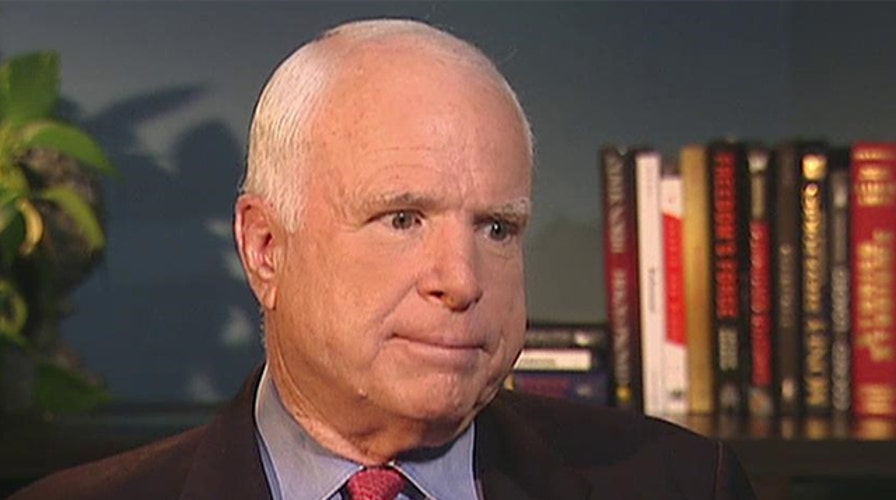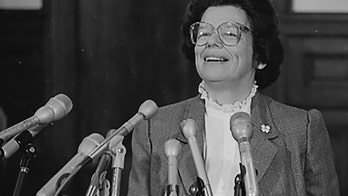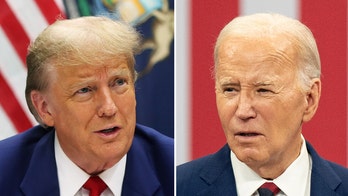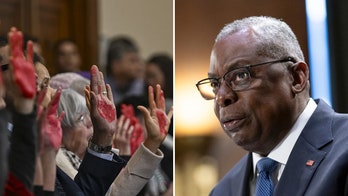It wasn’t exactly a breaking-news flash: John McCain Admits He Has a Temper.
But when McCain told me in a “MediaBuzz” interview about his reaction to negative stories, it was a glimpse of what it’s like to be on the receiving end, especially for a feisty lawmaker who enjoys mixing it up.
When the press took shots at him, “I will freely admit to you that years ago I used to get a lot more angry than I do today.” Now, he insists, “if there’s negative blows I try to put it in context. But am I completely immune to being unhappy about it? Hell no,” he declares with a hearty laugh.
Whether or not he’s got the anger thing under control, the Arizona senator is a great case study when it comes to media criticism because he has been both praised and pilloried by the MSM, the folks he once jokingly referred to as “my base.”
During his 2000 presidential campaign, I spent many days on the Straight Talk Express, watching McCain spar with reporters for eight or 10 hours a day, a strategy born of necessity because he had little money. Journalists came to understand both the man and his policies because they could ask questions until they were hoarse, and the chatter eventually moved on to sports or movies. And while McCain got burned occasionally, there is no question he benefited from the endless access, and got the benefit of the doubt because the journalists grew to like him.
But when he ran in 2008, things turned testy, and after he clinched the Republican nomination he largely cordoned off the press, like most candidates.
What happened? “It became a rather adversarial relationship, and it’s very unfortunate,” McCain says.
A classic example, he tells me, is when a reporter asked him how many houses he owned and McCain said he didn’t know. Of course, a calculated politician should have expected this would subject him to charges of being rich and out of touch, notwithstanding his explanation that the homes are owned by his wife Cindy.
But McCain says it was one of many comments “that I made in the context of a long conversation. If you took a sentence out, you could be critical.
“Well, that was happening to us more and more and frankly, one of the really disappointments to me, and I’ll take the blame for it, is the deterioration of a relationship, that wasn’t so much that we were friends, but that we had kind of an open relationship and the more time that I was able to spend with the media, the more I was able to make them understand exactly where I was coming from. Well, we lost that during the 2008 campaign.”
Of course, times change and issues change. In 2000, McCain ran on campaign finance reform (an outgrowth of his own bruising experience getting caught up in the Keating Five influence-peddling scandal) and against the big tax cut being pushed by his primary opponent, George W. Bush—and both had appeal to the MSM. By 2008, he was defending the Iraq war and proclaiming his support for the Bush surge. And this time he was running against a Democrat, Barack Obama.
Virtually all politicians get annoyed by their press coverage. McCain didn’t like the flood of stories pointing out that he had tacked right to win his 2010 primary in Arizona. The ex-POW is regularly portrayed as a hawk, but he has called for military aid or intervention in one trouble spot after another. At the same time, Politico had to run a correction last spring for reporting that McCain had pushed for invading North Korea and Iran.
When I asked him about calling Ted Cruz and Rand Paul “wacko birds,” he noted that he’d been reading from a Wall Street Journal editorial (and later apologized). But a senator has to know that sort of thing would go viral, regardless of whether he was quoting someone else.
McCain, for his part, believes the media’s tone depends on who his target is.
“When I said Donald Rumsfeld needs to be [replaced], ‘well here’s the brave maverick, standing up to his own party.’ When I say that the national security team is not serving this president well, ‘he’s the grumpy old man.’”
The press often decries the fact that politicians have become plastic and prepackaged, then penalizes them for slipping up, being provocative or telling a joke. McCain has had a bumpy ride with the media, but the old warrior still enjoys the battle.





